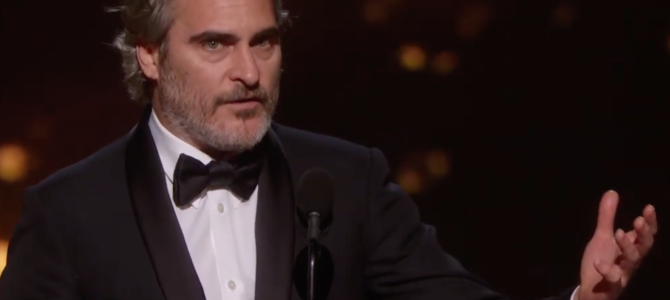
Without a host for the second straight year, the 2020 Oscars were neither aggressively boring nor especially memorable. By next February, I think my clearest recollection of the ceremony will be Joaquin Phoenix’s impassioned plea on behalf of artificially inseminated cows.
The show’s most interesting feature was also something of a weakness. “Parasite” swept several major categories, including Best Picture, Best Original Screenplay, and Best Director. As the very first non-English film to win the Academy’s top prize, “Parasite” made history. Still, the film entered the night with one of the least successful box office showings, topping only “Jojo Rabbit” domestically, meaning a good chunk of viewers probably hadn’t seen the night’s big winner. (Figures for Netflix films “Marriage Story” and “The Irishman” are unavailable.)
While Netflix led the pack in nominations, the streamer took home only two awards on Sunday. Martin Scorsese’s “The Irishman” lost all ten awards for which it was nominated. “The Two Popes” went zero for three; “Marriage Story” lost in five of six categories. In 2019, “Roma” made headlines for taking home three Oscars, including Best Director.
The show’s new host-less format gives presenters more space to shine, shifting focus from one personality fighting for the performance of his or her career to a slate of A-listers under less pressure. A musical opening from Janelle Monáe was generally a fine, high-energy celebration of the nominees.
The bits were largely well-written. Steve Martin and Chris Rock followed Monáe with an opening monologue that had just enough bite, even featuring a friendly nod to ousted 2019 host Kevin Hart. Pairs like Will Ferrell and Julia Louis-Dreyfus, Maya Rudolph and Kristin Wiig, and James Corden and Rebel Wilson provided some legitimate comic relief throughout the more than three-hour broadcast.
Laura Dern capped a successful awards season by earning Best Supporting Actress for her role in “Marriage Story,” propelling the “Dernaissance,” and cementing her status as America’s sweetheart with a moving speech that honored her parents. Billie Eilish and her brother Finneas O’Connell did a graceful job with the In Memoriam segment. Eminem’s random, but entertaining, “Lose Yourself” performance made for a memorable pop culture moment. While her acceptance speech was a little disjointed, Renee Zellweger’s win for Best Actress was a pleasant surprise.
Brad Pitt won the night’s first award, using his first seconds on stage to lament the lack of testimony from John Bolton in the Senate’s impeachment trial. But the politics were mostly predicable, and mostly uninteresting—occasional flare-ups of banal celebrity leftism. Introducing a performance by international Elsas from “Frozen II,” Josh Gad joked that “climate change deniers” call it “Not Frozen II,” and delivered another groaner: “The Canadian Elsa is basically the same, but with health care.”
While perceived lack of diversity among the nominees induced complaints about inclusivity of women and minorities, President Trump went largely ignored. The director of “American Factory” appeared to quote the Communist Manifesto by casually dropping the phrase “workers of the world unite” into her acceptance speech. (The film was produced by the Obamas.)
Phoenix swooped in towards the end to make things interesting. Rightfully crowned Best Actor for his sublime performance in “Joker,” the notoriously outspoken artist dove headfirst into a delightfully bizarre speech. “We’re talking about the fight against the belief that one nation, one people, one race, one gender or one species has the right to dominate, control and use and exploit another with impunity,” he said, decrying our “disconnect[ion] from the natural world.”
Phoenix then pivoted to cows. “We go into the natural world, and we plunder it for its resources. We feel entitled to artificially inseminate a cow, and when she gives birth, we steal her baby, even though her cries of anguish are unmistakable. Then, we take her milk, that’s intended for her calf, and we put it in our coffee and our cereal,” said the actor.
But like Martin and Rock’s monologue Phoenix’s speech also included a cogent indictment of so-called cancel culture. “Now, I have been a scoundrel in my life. I’ve been selfish. I’ve been cruel at times, hard to work with and ungrateful, but so many of you in this room have given me a second chance. And I think that’s when we’re at our best,” he argued, “when we support each other, not when we cancel each other out for past mistakes, but when we help each other to grow, when we educate each other, when we guide each other toward redemption.”
“That is the best of community,” said Phoenix, who ended the speech with a touching tribute to his late brother.
For a year honoring an excellent slate of films, the broadcast dragged. It wasn’t overtly terrible, offensively boring, or unusually political, but 2020 will likely be remembered only as the Oscars of “Parasite’s” history-making sweep. That’s all well and good for now, but to stave off future ratings declines in an increasingly competitive entertainment landscape, the Academy is going to need to do better.









